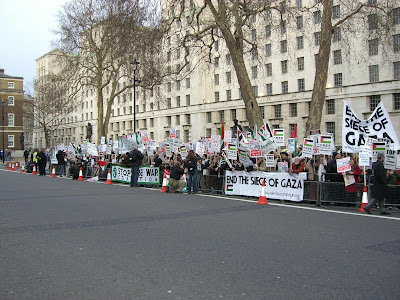I've been reviewing commentary in the Western media following Bhutto's assassination. Apart from the wholesale condemnation of her murder, one theme appears to dominate. It is something that should be familiar to those of us who visit countries that are routinely describe as lawless and wonder whether they have missed the party. Of course, this is not to say Pakistan is anything like completely stable. Only that to Western commentators, the only interest in countries like Pakistan seems to be in ensuring it isn't a source of violence or anti-Western sentiment. That there may be more texture to our people, that they may have something other than the destruction of Western civilization on their minds, is generally anathema to this perspective. I think acknowledging this is critical because it is this omission, this inability to humanise countries deemed to be 'the Other', that enables fear mongering to dictate policy making. If we know Pakistan has nukes, and we know it is unstable, but we have no idea that people in Pakistan for the most part are reasonable and seek security of livelihood like the rest of humanity (ie: the good civilised 'West'), then it is easier to conclude that our only rational option is to support dictators who will do our bidding and ignore the demands of the population.
Another aspect of this perspective is the tendency to blot out the role of the West in creating the violence now exhibited in countries like Pakistan. Let me give one overarching example.
It is no secret that there are many militant groups using the banner of Islam operating in Pakistan. The Pakistan Government, or sections of it at the very least, nurtured these groups. Most Western commentators focus on this. Viz, Pakistan is a state sponsor of terrorism. What is omitted is any acknowledgement of the role played by the United States in supporting these militant groups. Pakistan fostered militant Islamic fanaticism as a response to the Soviet invasion of Afghanistan. Hitherto, the phenomenon simply did not exist in the country. There were fanatics, but they were not militant, and they hardly had access to millions of funds and the best guerrilla warfare training. But the only reason Pakistan (which really means Pakistan's military elite) followed this course was because the United States wanted to bleed the Soviets in Afghanistan without risking a fatal direct confrontation. Although the US had retreated from Vietnam almost a decade prior to the Soviet invasion in 1979, the sentiment in Washington was that they could not politically countenance a direct military presence in Afghanistan. Moreover, Afghanistan was not unique. US Administrations from Ford to Carter, Reagan and Bush Snr lavishly supported terrorist activities by proxy in Central and South America at the same time that they supported terrorists in Afghanistan. It is only more recently with the remarkable success of the two invasions of Iraq (as opposed to the subsequent occupation with respect to the second invasion of Iraq), that the US has again begun to consider direct military intervention on a large scale.
As recently as the mid-1990s the Clinton Administration was airlifting Chechen militants into Bosnia to fight the Serbs to assist its Bosnian Muslim allies in that particular conflict. In Iraq this decade, the Bush Administration has openly admitted that it has set up the 'Wolf Brigades' modeled on death squads supported by the US in El Salvador some two decades previously. What is more, many of the very same architects of the carnage in El Salvador and other American countries around the same time, people such as current Under-secretary of State John Negroponte, have been party to the latest activities in Iraq.
None of this very important information is ever canvassed in mainstream Western reportage. There is a very simple explanation for this. What the South does may or may not be criminal depending upon their status as ally or foe. But what we do is either always benign or good, or is at the very worst misguided and mistaken. As to the latter category, it is never a crime.
I would therefore humbly suggest to those in the West interested in preventing the malaise of violence in Pakistan to begin by considering how best to constrain the US military machine. This is far from an abstract notion. For example, much time could and should be spent considering how to make US military aid more transparent. Certain key requirements could be written into aid measures so as to require the development of democracy along with Pakistan's military arsenal, to insist that money is invested in schools, in hospitals, in rule of law projects, and so on. I should add that much of the on paper law in the US already fulfills these requirements. What is lacking, and what requires an injection of activity, is the actual administration of these laws.
Instead, we read that Pakistan is complex, lawless, and it is best that we continue to favour the military. We cannot trust the people of Pakistan to keep us, in the West, safe from them. The greatest threat to the West is, all always, not ourselves, but some dreaded foe from abroad.














